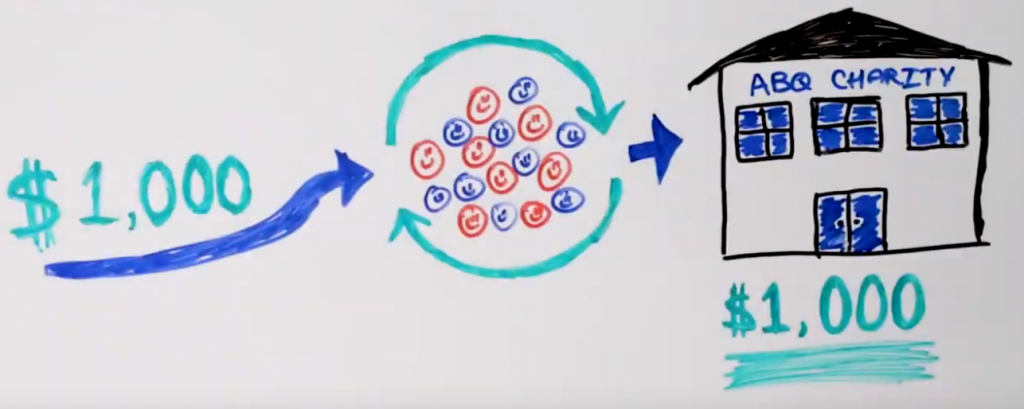Token Ibis Will Enable New Economic Activity
Although it’s an incredibly simple idea, Token Ibis can potentially create a ripple effect throughout local economies and eventually the entire world. Much of this new economic activity might come as a surprise even to us, but below are a few of the more obvious ways that Token Ibis can change how people transact with each other in the new philanthropy economy.

Personal Use
We may not realize it, but plain old money isn’t actually useful in every situation. For example, many people might feel strangely about accepting money from a close friend in exchange for a favor, like helping them move or giving them a ride across town. With Token Ibis, all that stigma is washed away and the gift of philanthropy can be given to anybody in any situation.
Despite the fact that a lot of the best work is done at the small local level, 86% of donations today go to the largest 1% of nonprofits. By emphasizing community relationships over ad campaigns and grant-seeking, Ibis can make it easier for grassroots organizations to raise the funds that they need to make a difference.
It’s difficult enough to convince people to make charitable donations as it is… add outdated payment methods to the equation and there’s no doubt many could-be donations are being lost every day. At its most basic level, the Token Ibis app makes charitable giving more likely to occur simply by making it super easy and convenient for everybody with a smartphone.
Business Models
One of the busiest joints in downtown Houston is a bar like Okra. Okra is much like any other bar except for the fact that 100% of its profits go toward charity. That’s why, despite the $20 starting price for whiskeys, people keep coming back. Okra is proof that philanthropy is hip and fun, and with the help of a ubiquitously used charity currency, we’d like to see more of these establishments in every city.
Philanthropy has the power to flip some activities that are fun but otherwise a little taboo. Imagine Ibis casinos, which resemble today’s casinos in every way, except the only currency used to buy chips or to cash them out is Token Ibis (and that goes for both players and the casino itself.) It’s almost as much fun, but win or lose, if you go to a Token Ibis casino you’ll leave feeling good about yourself.
These days, the media talks more about the trading price of Walmart stocks than the number of children with access to clean water. One way to bring in knowledge and awareness around these issues is to create a prediction market to track its progress. Again, while it feels wrong to gamble on social issues using normal money, we can imagine a world where Ibis is used as a fun and exciting medium for placing bets on human progress.
Financial Mechanisms
People might not spend their Ibis right away which means they need a place to store it, like a bank. Any institution that accepts deposits would be able to provide Ibis loans to struggling nonprofits at a lower interest rate than traditional banks. For organizations that depend on the generosity of potentially inconsistent donors, better access to these kinds of financial services could make a big difference.
Currently, “investing” in a nonprofit startup means sending over a generous grant and hoping for the best. But what if you could use Ibis to buy shares in the nonprofit, help them grow, and turn a profit once they become sustainable? With normal money, this kind of process would be immensely unethical and defeat the purpose of the nonprofit sector. However, with Ibis, all of the “profits” would, in turn, have to be used for philanthropy. Investors can put their Ibis where their mouth is to raise more money and support the social issues that they care about.
In 2013, Tobbe Eccles gave an excellent Ted Talk about “social impact bonds” [cite] as a way governments to fund solutions to difficult problems. In certain examples, such as reducing prisoner reincarceration, he showed that everyone could benefit if we let private investors come in and try to turn a profit. Although this idea works well economically, we think that there are some areas where it still feels wrong to open the door for monetary profit. In those instances, we think it feels slightly less wrong to do it with Ibis instead.
Many nonprofit workers are underpaid because they would rather make a big difference than a big salary. That won’t change any time soon but with Ibis, organizations can at least recognize the value of their workers with a supplementary Ibis bonus. While the money ultimately gets recycled back into the nonprofit sector, its workers can finally begin to gain the social influence and status that they deserve.
Political involvement today means having strong opinions about how much to tax the ultra-wealthy. We don’t have an official opinion, but Ibis offers a nice compromise. Suppose that instead of hiking up taxes, the IRS simply requires the individual to convert some of their income into Ibis – hence “mandatory altruism”. The left is happy(er) because the money gets redistributed eventually and the right is happy(er) because the individual retains some control and influence.
